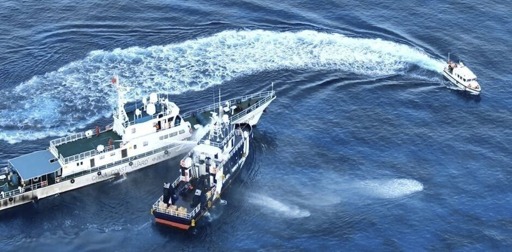Last week, Chinese coast guard vessels rammed and shot water cannon at Philippine ships in the South China Sea. The incident was well within the Philippines’ exclusive economic zone and was completely unprovoked.
It is the latest example of a sustained pattern of Chinese maritime coercion that has intensified over the past three years. Despite the growing frequency and sheer aggression of these tactics, international attention and official rebukes have noticeably waned in the past 12 months.
For Australia, a nation whose prosperity and security relies on maritime trade, there can be no room for complacency or desensitisation. China’s maritime aggression puts Australia at risk.
…
History teaches that once coercion goes unchecked, it tends to escalate. The incident last week is not an isolated provocation, but part of a continued deterioration of security in the waters around us.
Australia has both the right and the responsibility to challenge the normalisation of this kind of maritime aggression. We can push back by calling out each incident, continuing to deepen our regional partnerships, accelerating the development of our naval capabilities, and reinforcing international maritime law.
Our future prosperity, and the security of generations to come, depends on it.



Nope. For many reasons, getting with China means certain vassal State.
For instance, Australia’s current stance is that its only arguable whether Australia is a vassal Sate with the USA. Its definitely a close relationship, but on balance i think it comes out more a major-minor partnership, at least in this and since WW2’s strategic moment.
So stripping out cultural alignments, for only a second, it comes to a question of whether status-quo economic relationship is more valuable to the senior partner (Aus-China), than a strategic partnership to the senior partner (Aus -USA).
This makes it really easy, in an economic relationship you can get by with slaves in a worst case scenario, on the other hand you always need a certain goodwill from the minor country people to have near alignment with the major partner’s goals.
Putting the cultural alignments back in and it makes it difficult to see a closer alignment with China in the near future for Australia. Interestingly, i think the more culturally diverse we get the more we will in fact align with a country like the USA, not this fascist populism that has overtaken everything at the moment, but the general direction.
The theory that tying economies together stops war is just a theory, and i don’t think with a huge amount of evidence. I mean USA and USSR never went directly to war, and they had very limited trade. France and Germanic peoples went to war plenty, lots of trade reliance.
Portugal and England being famous allies, largely to their interlocking trade balances, among other geopolitical traits, might send this little argument down the toilet though, so maybe be a trade relationship ends up pretty net-net in the calculus for war.
Edit: Maybe it comes down to the reliance of the country on the type of traded good. Does its trade ceasing damage the importing country ina material way?
Australia is still in the commonwealth btw